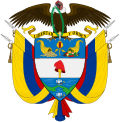History
Colombian conservatism holds Simón Bolívar and his ideals as central to its political principles. The first formal conservative Colombian party, known as "Republicanos Moderados" (Moderate Republicans) was created in 1837 by Jose Ignacio de Marquez. In the image of Bolivar, the party held to religious principles and favored order and control. In 1840, a civil war occurred that caused the proliferation of future political parties, including the Colombian Conservative Party, the current principal representative of this Bolivarian ideal.
Colombia has experienced many conservative movements. An example is the "Conservatismo Colombiano" party.
Other movements, such as that of Gustavo Rojas Pinilla, were also influenced by conservative ideals.
Another important movement, created by Nuñez, was a coalition between conservatives and moderate liberals called "Partido Nacional" (National Party).
The National Popular Alliance was established in the 1960s by disillusioned conservatives, and it later developed into a populist opposition party. Before the creation of the party, the members were called "Godos". These "Republicanos Moderados" and some other "radical conservatives" led to the beginnings of the Colombian Conservative Party.
This page is based on this
Wikipedia article Text is available under the
CC BY-SA 4.0 license; additional terms may apply.
Images, videos and audio are available under their respective licenses.
